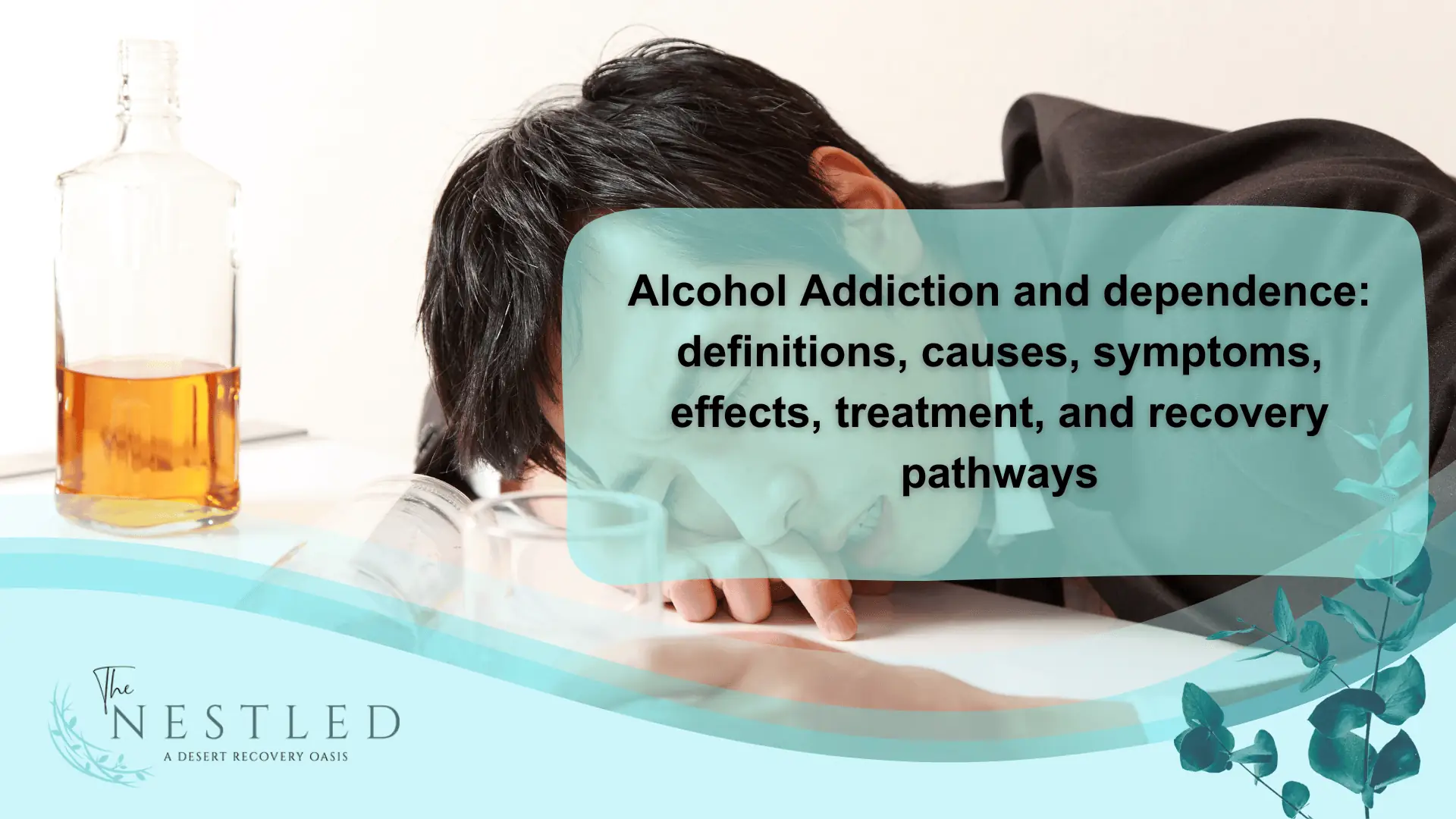Alcohol addiction, also known as alcoholism, is a prolonged pattern of alcohol use regardless of negative consequences. It is characterized by a loss of control over drinking, increased tolerance, and withdrawal symptoms when alcohol consumption is reduced or discontinued.
On the other hand, alcohol dependence often develops gradually. Individuals may rely on alcohol as a coping mechanism for stress, emotional difficulties, or other underlying issues.
The causes of alcohol addiction and dependence include genetic predisposition, environmental factors such as family history of alcoholism, psychological factors, and social influences that normalize excessive alcohol consumption.
Common signs of alcohol addiction and dependence are an inability to control or limit alcohol intake, neglecting responsibilities or hobbies, and experiencing withdrawal symptoms when attempting to quit.
Impacts of alcohol addiction goes beyond physical health. It can lead to liver damage, cardiovascular problems, and other serious medical conditions. Mental health can also be affected, with an increased risk of depression, anxiety, and cognitive impairment.
Treatment options for alcohol addiction may include detoxification, counseling, behavioral therapies, support groups, and medication-assisted treatments.
What is Alcohol Addiction and Dependence?
Alcohol addiction and alcohol dependence are related but distinct conditions. Alcohol addiction, or alcoholism, refers to a situation where a person becomes chronically and compulsively dependent on alcohol, even when it causes negative consequences. It involves losing control over drinking, developing tolerance (needing more alcohol to achieve the same effect), and experiencing withdrawal symptoms when trying to cut down or quit.
On the other hand, alcohol dependence occurs when the body becomes physically reliant on alcohol. It often develops gradually as individuals start using alcohol as a way to cope with stress or other difficulties. Alcohol dependence is characterized by tolerance (needing more alcohol for the same effect), withdrawal symptoms when alcohol is stopped or reduced, and strong cravings for alcohol.
The mechanisms behind addiction and dependence related to alcohol are complex. With repeated alcohol use, the brain adapts by reducing dopamine production, leading to a diminished response to alcohol. This often results in the need for larger amounts of alcohol to achieve the desired effect, known as tolerance.
On the flip side, alcohol dependence involves physiological changes in the body. Regular alcohol consumption disrupts the balance of neurotransmitters in the central nervous system.
Over time, the body adapts to alcohol’s presence and becomes dependent on it to function normally. When alcohol is reduced or stopped, withdrawal symptoms occur as the body adjusts to the absence of alcohol.
In alcohol dependence, tolerance refers to the body’s reduced response to alcohol, requiring higher amounts to achieve the desired effects. Withdrawal symptoms occur when a person suddenly reduces or stops alcohol consumption, resulting in physical and psychological discomfort. These symptoms can vary in severity and may include trembling, anxiety, sweating, nausea, and even seizures.
What are the Causes of Alcohol Addiction and Alcohol Dependence?
The causes and risk factors of alcohol addiction and dependence are many. Here are some key ones to look out for:
1. Genetic predisposition and family history
Studies have shown that specific genetic variations can influence an individual’s susceptibility to these conditions. For instance, certain genes involved in regulating neurotransmitters like dopamine, which is associated with reward and pleasure, may impact a person’s response to alcohol.
Furthermore, a family history of alcoholism can increase the risk of developing alcohol addiction and dependence. Growing up in an environment where alcohol misuse is prevalent can expose individuals to both genetic and environmental factors that contribute to the development of these conditions.
2. Environmental factors
If someone is surrounded by friends or acquaintances who engage in heavy drinking or encourage excessive alcohol use, they may be more inclined to adopt similar behaviors. Peer pressure and the desire to fit in can contribute to the initiation and continuation of alcohol misuse.
In certain cultures or social settings, alcohol consumption may be widely accepted or even celebrated. This normalization of heavy drinking can create an environment where excessive alcohol use is considered more socially acceptable. Consequently, individuals growing up in such cultures or social contexts may face a higher risk of developing alcohol addiction and dependence.
3. Co-occurring mental health disorders
Alcohol addiction and alcohol dependence often co-occur with various mental health disorders, such as depression. Some individuals with depression may turn to alcohol as a way to self-medicate and alleviate their symptoms temporarily.
However, alcohol is a depressant and can worsen depressive symptoms in the long run. This cycle of using alcohol to cope with depression can lead to a detrimental pattern of alcohol addiction and dependence.
4. Traumatic experiences and stress
Some people may turn to alcohol as a way to cope with the distressing memories and emotions associated with trauma. Similarly, chronic stress, whether related to work, relationships, or other life circumstances, can contribute to the development of alcohol addiction and dependence. Alcohol may be used as a means to escape or temporarily alleviate stress, leading to a reliance on alcohol as a coping mechanism.
5. Early initiation of alcohol use
Early initiation of alcohol use, especially during adolescence, can be a significant risk factor. The brain undergoes critical development during this period, and alcohol use can interfere with this process, potentially increasing the vulnerability to addiction.
Also, early initiation of alcohol use may expose individuals to risky drinking behaviors, peer pressure, and alcohol-related problems, which can contribute to the development of alcohol addiction and dependence later in life.
Symptoms of Alcoholism and Dependence

Recognizing the symptoms is important for understanding and addressing the problem effectively. Here are the key symptoms associated with alcoholism addiction and dependence:
1. Behavioral changes and compulsive alcohol-seeking behavior
One of the primary symptoms of alcohol addiction and dependence is a noticeable behavior change. An individual may exhibit an increasing preoccupation with alcohol, spending a significant amount of time thinking about obtaining and consuming it.
They may also develop a strong compulsion to drink, feeling a persistent urge or craving for alcohol that becomes difficult to resist. As addiction progresses, individuals may prioritize alcohol over other activities and responsibilities, neglecting hobbies, work, or social engagements.
2. Physical and psychological symptoms
Physically, individuals may experience tolerance, where larger amounts of alcohol are required to achieve the desired effect. They may also develop withdrawal symptoms when attempting to cut down or stop drinking, such as tremors, sweating, nausea, anxiety, or insomnia.
Psychological symptoms can include mood swings, irritability, agitation, and increased anxiety or depression. Cognitive impairments, such as difficulties with memory, attention, and decision-making, may also be present.
3. Impact on health, relationships, and overall functioning
Prolonged and excessive alcohol use can lead to a range of physical health problems, including liver disease, cardiovascular issues, gastrointestinal complications, and neurological impairments.
Mental health may also be affected, with an increased risk of developing or exacerbating conditions such as depression and anxiety. Relationships with family, friends, and colleagues may become strained due to conflicts related to alcohol use, unreliability, or withdrawal from social activities.
Overall, alcohol addiction and dependence can impair an individual’s ability to fulfill responsibilities, maintain stable employment, and lead a fulfilling and balanced life.
4. Loss of control
Individuals with alcoholism and dependence often experience a loss of control over their drinking. They may find it challenging to limit the amount of alcohol they consume or to stop drinking once they have started. Despite their best intentions or negative consequences associated with their drinking, they may repeatedly engage in excessive alcohol consumption.
5. Neglecting other activities
Alcoholism and dependence can lead to a significant shift in priorities, with affected individuals often neglecting previously enjoyed activities or responsibilities. They may lose interest in hobbies, social events, or work obligations as their focus increasingly revolves around obtaining and consuming alcohol. This neglect can have a detrimental impact on various areas of their life, including personal relationships, careers, and overall well-being.
Alcohol Addiction Vs. Alcohol Dependence: What are the treatment approaches?
The treatment of alcohol addiction and dependence typically involves a combination of approaches to address the physical, psychological, and social aspects of the condition. Here are some commonly used treatment methods:
1. Detoxification
For people with severe alcohol addiction or dependence, medical detoxification may be necessary. Detoxification involves safely managing the physical withdrawal symptoms that occur when alcohol use is abruptly stopped. This process is usually conducted under medical supervision, either in an inpatient or outpatient setting, to ensure the individual’s safety and comfort.
2. Behavioral therapies
Various behavioral therapies are effective in treating alcohol addiction and dependence. These therapies aim to modify unhealthy thoughts, beliefs, and behaviors associated with alcohol use and develop healthier coping mechanisms.
Cognitive-behavioral therapy (CBT), Motivational Enhancement Therapy (MET), and contingency management are some commonly used behavioral therapies.
3. Medications
Medications can be prescribed as part of the treatment for alcohol addiction and dependence. These medications can help individuals manage cravings, reduce withdrawal symptoms, and prevent relapse. Some common medications your doctor may prescribe are naltrexone, disulfiram, and acamprosate.
4. Support Groups and Peer Support
Participation in support groups, such as Alcoholics Anonymous (AA) or other mutual-help groups, can be highly beneficial. These groups provide a supportive environment where individuals can share experiences, receive encouragement, and learn from others who have faced similar challenges.
5. Comprehensive Treatment Programs
Comprehensive treatment programs, such as residential treatment or intensive outpatient programs, offer a structured and supportive environment for individuals seeking recovery from alcohol addiction and dependence. These programs typically combine various treatment modalities, including therapy, education, relapse prevention, and aftercare planning.
Recovery Pathways and Strategies for Alcoholism and Dependence
To recover from alcoholism and dependence, you would need to go through a journey that involves a range of pathways and strategies. Here are some options for you:
- Make a firm commitment to achieving and maintaining sobriety. This involves a strong determination to abstain from alcohol use and a willingness to make necessary changes in one’s life.
- Seek professional help from healthcare providers, addiction specialists, or treatment centers. These professionals can provide guidance, support, and evidence-based interventions tailored to an individual’s specific needs.
- Engage in structured treatment programs like inpatient rehabilitation programs that offer a residential setting where individuals receive intensive treatment, counseling, and support in a controlled environment.
- Participating in support groups like Alcoholics Anonymous (AA) or other mutual-help groups can provide a valuable support network.
- Developing healthy coping mechanisms to deal with stress, cravings, and triggers instead of turning to alcohol.
- Prioritizing self-care activities, such as practicing mindfulness, engaging in hobbies, getting enough sleep, and managing stress effectively.
It’s important to remember that each individual’s recovery journey is unique, and what works for one person may not work for another. If you’re looking for reliable professionals who will help you find a combination of strategies and pathways that resonate with your addiction needs, then we are your best bet.
What are the common risk factors and genetic predispositions shared by individuals with alcohol addiction and Adderall addiction?
Individuals with alcohol addiction and Adderall addiction may share several common risk factors and genetic predispositions. Both conditions can be influenced by genetic factors, as certain genetic variations have been associated with an increased susceptibility to addiction.
Additionally, family history of substance abuse disorders, environmental factors such as exposure to substance use at a young age, and co-occurring mental health disorders like depression or anxiety can contribute to the development of both alcohol and Adderall addiction.
Furthermore, personality traits such as impulsivity, sensation-seeking behavior, and a history of trauma or adverse childhood experiences may also increase the risk for both types of addiction.
At The Nestled Recovery Center, we provide professional guidance throughout the recovery process and can help tailor an effective and personalized approach to overcoming alcoholism and dependence. Contact us today to get started!








